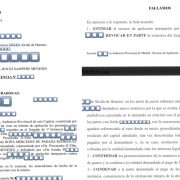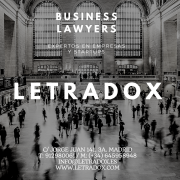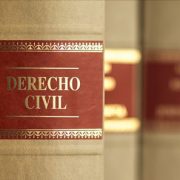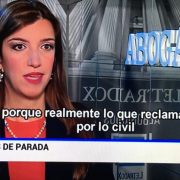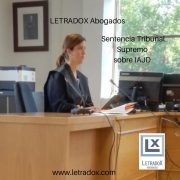Todas las preguntas y respuestas sobre los procedimientos judiciales.
Todas las preguntas y respuestas sobre los procedimientos judiciales.
LETRADOX® Abogados
(English version below)
En esta serie de 6 vídeos resolvemos las principales dudas que nos transmiten nuestros clientes a lo largo de los procedimientos judiciales.
- Demanda
- Contestación a la demanda
- Audiencia Previa
- Juicio
- Sentencia
- Costas
¿Cómo son los procedimientos judiciales? En estos vídeos realizados por nuestro equipo, la letrada doña Mercedes de Parada, fundadora y CEO de Letradox®, de principio a fin lo explica de manera sencilla.
LETRADOX® Abogados
C/ Jorge Juan 141. 3A. Madrid
Tlfs: 912980061 / 645958948
Vídeo 1.
La demanda
El juicio principiará por demanda, en la que, consignados de conformidad con lo que se establece en la ley los datos y circunstancias de identificación del actor y del demandado y el domicilio o residencia en que pueden ser emplazados, se expondrán numerados y separados los hechos y los fundamentos de derecho y se fijará con claridad y precisión lo que se pida.
Junto a la designación del actor se hará mención del nombre y apellidos del procurador y del abogado, cuando intervengan.
Los hechos se narrarán de forma ordenada y clara con objeto de facilitar su admisión o negación por el demandado al contestar. Con igual orden y claridad se expresarán los documentos, medios e instrumentos que se aporten en relación con los hechos que fundamenten las pretensiones y, finalmente, se formularán, valoraciones o razonamientos sobre éstos, si parecen convenientes para el derecho del litigante.
En los fundamentos de derecho, además de los que se refieran al asunto de fondo planteado, se incluirán, con la adecuada separación, las alegaciones que procedan sobre capacidad de las partes, representación de ellas o del procurador, jurisdicción, competencia y clase de juicio en que se deba sustanciar la demanda, así como sobre cualesquiera otros hechos de los que pueda depender la validez del juicio y la procedencia de una sentencia sobre el fondo.
En la petición, cuando sean varios los pronunciamientos judiciales que se pretendan, se expresarán con la debida separación. Las peticiones formuladas subsidiariamente, para el caso de que las principales fuesen desestimadas, se harán constar por su orden y separadamente.
Video 2.
La contestación a la demanda.
El Letrado de la Administración de Justicia, examinada la demanda, dictará decreto admitiendo la misma y dará traslado de ella al demandado para que la conteste en el plazo de veinte días.
En la contestación a la demanda, que se redactará en la forma prevenida para la demanda, el demandado expondrá los fundamentos de su oposición a las pretensiones del actor, alegando las excepciones materiales que tuviere por conveniente. Si considerare inadmisible la acumulación de acciones, lo manifestará así, expresando las razones de la inadmisibilidad. También podrá manifestar en la contestación su allanamiento a alguna o algunas de las pretensiones del actor, así como a parte de la única pretensión aducida.
En la contestación a la demanda habrán de negarse o admitirse los hechos aducidos por el actor. El tribunal podrá considerar el silencio o las respuestas evasivas del demandado como admisión tácita de los hechos que le sean perjudiciales.
También habrá de aducir el demandado, en la contestación a la demanda, las excepciones procesales y demás alegaciones que pongan de relieve cuanto obste a la válida prosecución y término del proceso mediante sentencia sobre el fondo.
Video 3.
Audiencia Previa
Una vez contestada la demanda y, en su caso, la reconvención, o transcurridos los plazos correspondientes, se celebra la audiencia previa.
Se informará a las partes de la posibilidad de recurrir a una mediación.
Las partes habrán de comparecer en la audiencia asistidas de abogado y con procurador.
Si no compareciere a la audiencia ninguna de las partes, se levantará acta haciéndolo constar y el tribunal, sin más trámites, dictará auto de sobreseimiento del proceso, ordenando el archivo de las actuaciones.
También se sobreseerá el proceso si a la audiencia sólo concurriere el demandado y no alegare interés legítimo en que continúe el procedimiento para que se dicte sentencia sobre el fondo. Si fuere el demandado quien no concurriere, la audiencia se entenderá con el actor en lo que resultare procedente.
Cuando faltare a la audiencia el abogado del demandante, se sobreseerá el proceso, salvo que el demandado alegare interés legítimo en la continuación del procedimiento para que se dicte sentencia sobre el fondo. Si faltare el abogado del demandado, la audiencia se seguirá con el demandante en lo que resultare procedente.
Video 4.
El juicio.
El juicio tendrá por objeto la práctica de las pruebas de declaración de las partes, testifical, informes orales y contradictorios de peritos, reconocimiento judicial en su caso y reproducción de palabras, imágenes y sonidos. Asimismo, una vez practicadas las pruebas, en el juicio se formularán las conclusiones sobre éstas.
Si no compareciere en el juicio ninguna de las partes, se levantará acta haciéndolo constar y el tribunal, sin más trámites, declarará el pleito visto para sentencia. Si sólo compareciere alguna de las partes, se procederá a la celebración del juicio.
El juicio comenzará practicándose las pruebas admitidas.
Practicadas las pruebas, las partes formularán oralmente sus conclusiones sobre los hechos controvertidos, exponiendo de forma ordenada, clara y concisa, si, a su juicio, los hechos relevantes han sido o deben considerarse admitidos y, en su caso, probados o inciertos.
Video 5.
Sentencia.
La sentencia, según la ley, se dictará dentro de los veinte días siguientes a la terminación del juicio. (Aunque depende de la carga de trabajo de cada juzgado. Puede ser antes o después de ese plazo).
Una vez que se pronuncia la Sentencia, y ésta, por ejemplo determina que el condenado tiene que pagar una cantidad de dinero; si no lo hace , hay que instar un procedimiento de ejecución de sentencia.
Una vez que cumple el condenado, (ya sea después del procedimiento de ejecución o no), éste tiene que depositar el dinero al juzgado y el juzgado expide un mandamiento de pago (o por transferencia) que hace entrega al procurador. La manera de hacerse depende de cada juzgado. Finalmente, el dinero que corresponde se abona al ganador del pleito. La duración de estos trámites depende de la carga de trabajo de cada juzgado, por lo que no podemos precisarlo. En cualquier caso, cuando el abogado tiene noticia por el juzgado de que se han efectuado estos trámites, se lo comunica al cliente.
Video 6.
¿Quién paga las costas de un juicio?
Según la ley; en los procesos declarativos, las costas de la primera instancia se impondrán a la parte que haya visto rechazadas todas sus pretensiones, salvo que el tribunal aprecie, y así lo razone, que el caso presentaba serias dudas de hecho o de derecho.
Para apreciar, a efectos de condena en costas, que el caso era jurídicamente dudoso se tendrá en cuenta la jurisprudencia recaída en casos similares.
Si fuere parcial la estimación o desestimación de las pretensiones, cada parte abonará las costas causadas a su instancia y las comunes por mitad, a no ser que hubiere méritos para imponerlas a una de ellas por haber litigado con temeridad.
All questions and answers about court proceedings.
LETRADOX Lawyers
In this series of 6 videos we solve the main doubts that our clients transmit to us throughout the legal proceedings.
- Demand
- Statement of Defence
- Pretrial conference
- Trial
- Judgment
- Court costs
What are the court procedures like? From start to finish we explain it to you in a simple way in this video of the lawyer Mrs. Mercedes de Parada, founder and CEO of Letradox®.
Video 1.
The claim
The lawsuit shall begin with the application, in which, in accordance with the provisions of the law, the details and circumstances of identification of the plaintiff and the defendant and the domicile or residence where they may be summoned, the facts and grounds of law shall be set out numbered and separately, and what is requested shall be clearly and precisely stated.
In addition to the name of the plaintiff, the name and surname of the procurator and of the advocate, where they intervene, shall be stated.
The facts shall be set out in an orderly and clear manner in order to facilitate their admission or denial by the defendant when answering. In the same order and with the same clarity, the documents, means and instruments that are provided in relation to the facts on which the claims are based shall be expressed and, finally, assessments or reasoning on these shall be formulated, if they seem appropriate for the rights of the litigant.
In the grounds of law, in addition to those relating to the merits of the case, the appropriate arguments concerning the capacity of the parties, the representation of the parties or of the procurator, jurisdiction, competence and the type of trial in which the claim is to be heard, as well as any other facts on which the validity of the trial and the validity of a judgement on the merits may depend, shall be included with appropriate separation.
Where several judgments are sought, they shall be stated in the application in such a way as to be duly separated. The applications made in the alternative, in the event that the main applications are rejected, shall be stated in their order and separately.
Video 2.
The defence to the application.
After examining the claim, the Legal Secretary for the Administration of Justice shall issue a decree admitting the claim and shall send it to the defendant so that he may answer it within twenty days.
In the defence to the application, which shall be drawn up in the form provided for the application, the defendant shall set out the grounds of his opposition to the claims of the plaintiff, raising such defences as he deems appropriate. If he considers the consolidation of actions to be inadmissible, he shall so state, stating the reasons for the inadmissibility. He may also state in his defence his acquiescence in one or more of the plaintiff’s claims or in part of the sole claim asserted.
The statement of defence must deny or admit the facts relied on by the plaintiff. Silence or evasive answers by the defendant may be considered by the court as tacit admission of facts detrimental to the defendant.
The defendant must also, in his defence to the claim, raise pleas in law and other pleas in law that may obstruct the valid continuation and termination of the proceedings by means of a judgement on the merits of the case.
Video 3.
Preliminary Hearing
Once the claim and, where appropriate, the counterclaim have been answered, or once the corresponding time limits have elapsed, the preliminary hearing is held.
The parties will be informed of the possibility of mediation.
The parties must appear at the hearing in the presence of a lawyer and a solicitor.
If none of the parties appear at the hearing, a record shall be drawn up and the court shall, without further formality, issue an order to dismiss the proceedings, ordering the proceedings to be closed.
The proceedings shall also be dismissed if only the defendant attends the hearing and does not allege a legitimate interest in the continuation of the proceedings so that a judgement on the merits may be handed down.
If :
it is the defendant who does not attend, the hearing shall be heard with the plaintiff in so far as is appropriate.
the applicant’s lawyer does not attend the hearing, the proceedings shall be dismissed, unless the defendant claims a legitimate interest in the continuation of the proceedings for judgment on the merits.
– the defendant’s counsel is absent, the hearing shall be continued with the plaintiff in so far as is appropriate.
Video 4.
The trial.
The purpose of the trial will be the taking of evidence of the parties’ statements, testimonies, oral and contradictory reports of experts, judicial recognition if necessary, and the reproduction of words, images and sounds. Likewise, once the evidence has been taken, conclusions shall be drawn from it at the trial.
If none of the parties appear at the trial, a record shall be drawn up stating this and the court shall, without further formality, declare the case to be ready for judgement. If only one of the parties appears, the trial shall proceed.
The trial shall commence with the taking of the evidence admitted.
Once the evidence has been heard, the parties shall orally formulate their conclusions on the disputed facts, setting out in an orderly, clear and concise manner, whether, in their opinion, the relevant facts have been or should be considered admitted and, where appropriate, proven or uncertain.
Video 5.
Sentence.
The judgment, according to the law, will be issued within twenty days after the end of the trial (although it depends on the workload of each court. It may be before or after this period).
Once the sentence is pronounced, and it determines, for example, that the sentenced person has to pay an amount of money; if he/she does not do so, a procedure for the execution of the sentence must be initiated.
Once the defendant complies (whether after the enforcement procedure or not), he/she has to deposit the money with the court and the court issues a payment order (or transfer order) which is handed over to the procurator. How this is done depends on the court. Finally, the money is paid to the winner of the lawsuit. The duration of these procedures depends on the workload of each court, which is why we are unable to say exactly how long it takes. In any case, when the lawyer is informed by the court that these procedures have been carried out, he/she informs the client.
Video 6.
Who pays the costs of a trial?
According to the law, in declaratory proceedings, the costs of the first instance will be imposed on the party whose claims have been rejected in their entirety, unless the court finds, and so reasons, that the case presented serious doubts of fact or law.
For the purpose of assessing whether the case was legally doubtful, account shall be taken of the case-law in similar cases.
In the event of a partial grant or dismissal of the claims, each party shall pay the costs incurred at its own instance and the common costs in halves, unless there are grounds for awarding them to one of the parties on the ground that it has litigated recklessly.
LETRADOX® Lawyers
Jorge Juan 141 St. 3A. Madrid (Spain)
Tlfs: +34 912980061 / 645958948
Email: info@letradox.es
Web: www.Letradox.com



